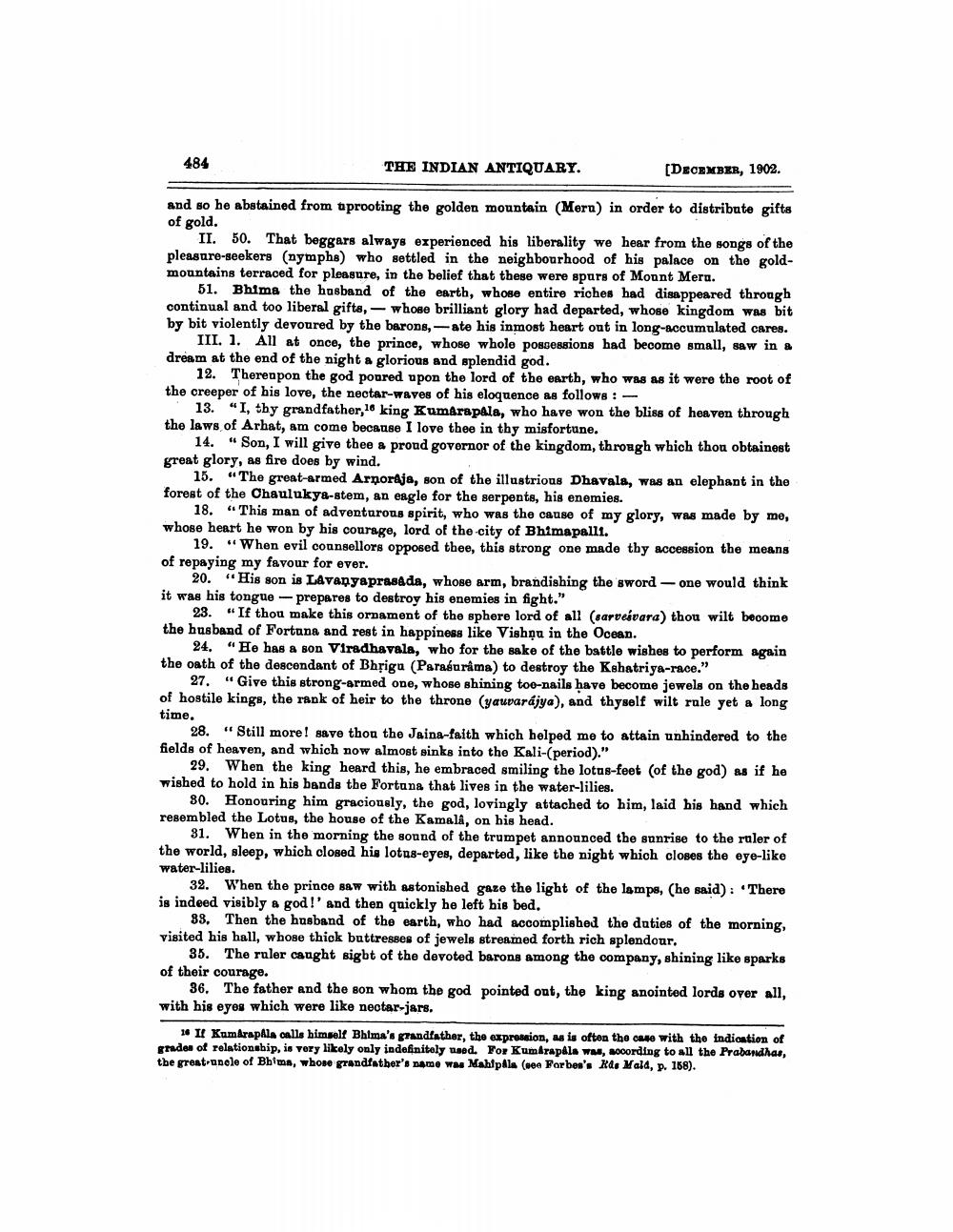________________
484
THE INDIAN ANTIQUARY.
[DECEMBER, 1902.
and so he abstained from tprooting the golden mountain (Mern) in order to distribute gifts of gold.
II. 50. That beggars always experienced his liberality we hear from the songs of the pleasure-seekers (nymphs) who settled in the neighbourhood of his palace on the goldmountains terraced for pleasure, in the belief that these were spurg of Mount Mera.
51. Bhima the husband of the earth, whose entire riches had disappeared through continual and too liberal gifts, - whose brilliant glory had departed, whose kingdom was bit by bit violently devoured by the barons, -ate his inmost heart ont in long-accumulated cares.
III. 1. All at once, the prince, whose whole possessions had become small, saw in a dream at the end of the night a glorious and splendid god.
12. Therenpon the god poured upon the lord of the earth, who was as it were the root of the creeper of his love, the nectar-waves of his eloquence as follows:
13. "I, thy grandfather, 16 king Kumarapala, who have won the bliss of heaven through the laws of Arhat, am come because I love thee in thy misfortune.
14. "Son, I will give thee a prond governor of the kingdom, through which thou obtainest great glory, as fire does by wind.
15. "The great-armed Arnordja, son of the illustrious Dhavala, was an elephant in the forest of the Chaulukya-stem, an eagle for the serpents, his enemies.
18. “This man of adventurous spirit, who was the cause of my glory, was made by me, whose heart he won by his courage, lord of the city of Bhimapalli.
19. “When evil counsellors opposed thee, this strong one made thy accession the means of repaying my favour for ever.
20. "His son is Lavanyaprasada, whose arm, brandishing the sword - one would think it was his tongue - prepares to destroy his enemies in fight."
23. "If thou make this ornament of the sphere lord of all (sarvesvara) thou wilt become the husband of Fortuna and rest in happiness like Vishnu in the Ocean.
24. "He has a son Viradhavala, who for the sake of the battle wishes to perform again the oath of the descendant of Bhrigu (Parasurama) to destroy the Kshatriya-race.”
27. "Give this strong-armed one, whose shining too-nails have become jewels on the heads of hostile kings, the rank of heir to the throne (yauparájya), and thyself wilt role yet a long
time.
28. "Still more! save thou the Jaina-faith which helped me to attain unhindered to the fields of heaven, and which now almost sinks into the Kali-(period)."
29. When the king heard this, he embraced smiling the lotus-feet (of the god) as if he wished to hold in his bands the Fortuna that lives in the water-lilies.
80. Honouring him graciously, the god, lovingly attached to him, laid his hand which resembled the Lotus, the house of the Kamala, on his hend.
31. When in the morning the sound of the trumpet announced the sunrise to the ruler of the world, sleep, which closed his lotus-eyes, departed, like the night which closes the eye-like water-lilies.
32. When the prince saw with astonished gaze the light of the lamps, (he said): There is indeed visibly a god!' and then qnickly he left his bed,
88. Then the husband of the earth, who had accomplished the duties of the morning, visited his hall, whose thick buttresses of jewels streamed forth rich splendour,
35. The ruler caught sigbt of the devoted barons among the company, shining like sparks of their courage.
36. The father and the son whom the god pointed ont, the king anointed lords over all, with his eyes which were like nectar-jars.
16 II Kumarapala calls himself Bhima's grandfather, the expression, as is often tho 640 with the indication of graden of relationship, is very likely only indefinitely need. For Kumbrapala was, according to all the Prabandhas, the great upole of Bhima, whose grandfather's name was Mahipals (on Forbes's Kdo Mald, p. 158).




